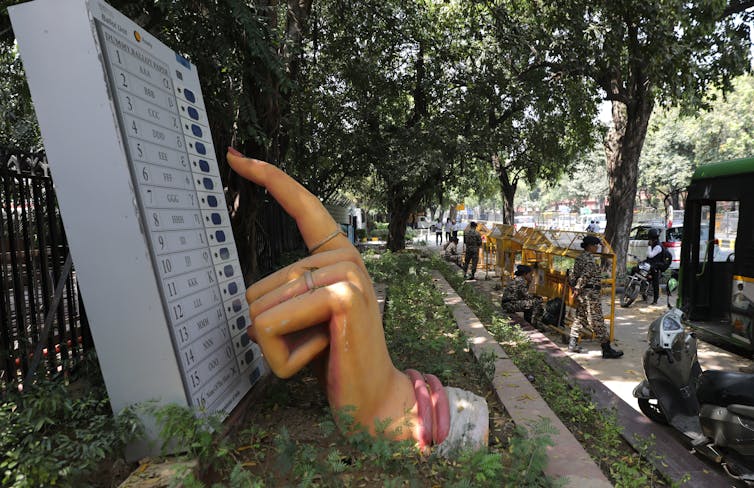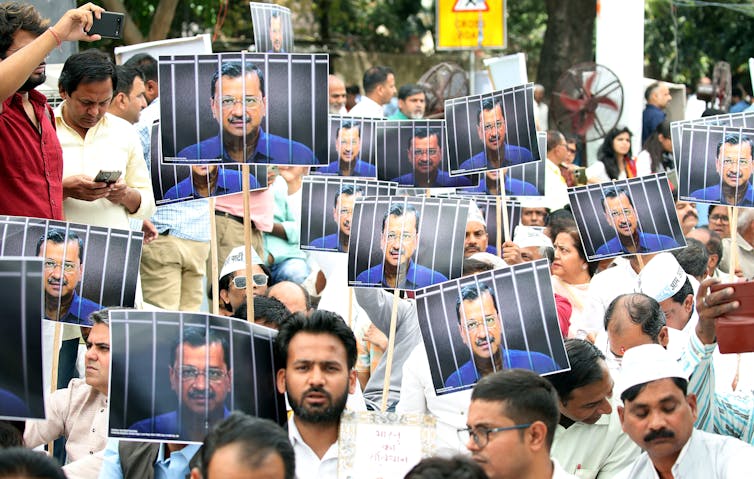[ad_1]
India’s prime minister, Narendra Modi, is favoured to win reelection when India’s 970 million voters begin heading to the polls on April 19 within the nation’s large, six-week basic election.
Modi, who has been prime minister since 2014, has benefited from a divided opposition, glowing mainstream media protection and excessive financial development charges.
However, current polling signifies important voter discontent over inflation and unemployment. While 44% of respondents need the Modi authorities to return to energy, a sizeable 39% are not looking for his Bhartiya Janata Party (BJP) to be reelected.
Moreover, Modi’s election marketing campaign has been tainted by a number of occasions in current weeks:
-
the arrest of a serious opposition chief in what his occasion says was a “conspiracy” by Modi’s authorities
-
the freezing of the accounts of the most important opposition Congress occasion over a tax dispute
-
revelations of closely skewed political financing favouring Modi’s occasion.
These incidents have raised issues about how free and honest India’s election will really be.
India’s democratic decline
For a lot of its historical past as an unbiased state, India has been an electoral democracy, defying political sociologist Seymour Lipset’s theory that democratic establishments and cultures often solely thrive in prosperous societies.
Barring a interval of emergency rule within the Seventies when elections have been suspended, India has met the brink totally free and honest elections all through its historical past.
Voter turnout in elections has sometimes been excessive, at round 70%. A fancy electoral structure has additionally been put in place to make sure electoral integrity, involving:
-
phased voting over a lot of weeks
-
a model code of conduct governing how events and candidates should behave in elections
-
travelling electoral and safety officers to supervise the voting course of and attain all voters
-
the implementation of an electronic voting system to stop electoral fraud.

Altaf Qadri/AP
Since 2018, nevertheless, there was a steep decline within the high quality of India’s electoral democracy. The V-Dem Institute, which tracks democratic freedom across the globe, now considers India to be an electoral autocracy, which suggests it nonetheless holds common elections however its authorities is more and more autocratic.
V-Dem additionally says India doesn’t have ample safeguards in place to make sure free and honest elections.
What makes elections free and honest?
To safeguard electoral integrity, governments should make sure the free participation of all events and voters in elections and keep an unbiased election fee. All candidates will need to have equal entry to the media, which ought to act as a watchdog. Incumbents mustn’t have a big monetary benefit over opponents.
These norms of electoral integrity have been endorsed in quite a few international and domestic codes of conduct, treaties and protocols all over the world.
However, the world is experiencing a new wave of autocratisation, and electoral manipulation is on the rise.
Of specific concern is long-term electoral manipulation that leads to the dearth of a degree enjoying discipline. This entails political financing that favours one occasion over others, the political persecution of opposition politicians and journalists, media dominance by incumbents and the erosion of unbiased electoral establishments.
Read extra:
India elections: ‘Our rule of law is under attack from our own government, but the world does not see this’
An uneven political financing system
On February 15, an opaque system of political financing launched beneath the Modi authorities in 2017 was declared unconstitutional by the Supreme Court. In this “electoral bonds” system, people and corporations have been permitted to make limitless and nameless donations to political events by means of the acquisition of bonds from the State Bank of India.
The Supreme Court ordered the discharge of the names of donors and recipients regardless of resistance from the financial institution.
These information revealed Modi’s BJP because the prime beneficiary of a whole bunch of tens of millions of {dollars} of donations by companies and people since 2019.
Thirty-three companies donated electoral bonds value greater than their earnings, elevating questions in regards to the true supply of those funds. And three-quarters of those donations went to the BJP.
Thirty company donors have been additionally discovered to have bought electoral bonds after India’s Enforcement Directorate, which investigates financial crimes, and the Tax Department launched investigations in opposition to them for cash laundering and tax violations.
In addition, Indian media reported that corporations donating massive quantities to the BJP have been later awarded main authorities contracts.
Targeting the opposition
Opposition leaders allege the Modi authorities can be misusing state businesses to focus on them.
For occasion, a media report revealed that 95% of investigations by the Enforcement Directorate because the BJP got here into energy in 2014 have targeted on the opposition. There has additionally been a five-fold increase within the variety of cash laundering investigations by the physique since 2014.
The Enforcement Directorate has been unable to show most of those circumstances. In truth, it has a lower than a 0.5% conviction rate relationship again to 2005.
Modi has denied accusations he has used the physique to focus on the opposition. However, Indian media have discovered corruption investigations involving 23 of 25 opposition politicians have been shelved after they defected to the BJP.
In current days, a well-liked opposition chief and anti-corruption campaigner, Delhi Chief Minister Arvind Kejriwal, was additionally jailed on allegations he acquired kickbacks from the Delhi authorities’s try to privatise the liquor trade. The Enforcement Directorate has but to offer proof of his guilt.

Harish Tyagi/EPA
Monitoring the election
Once thought of a robustly unbiased establishment, the Indian Election Commission’s repute has been tarnished by questions on its impartiality.
It has didn’t adequately tackle criticisms of its weakening of verification processes within the electronic voting system, in addition to allegations of voter suppression of Muslims, Dalits and women.
Indian democracy shouldn’t be, nevertheless, dying in darkness. While the Supreme Court’s independence has been questioned, its persistence in difficult the federal government on the difficulty of electoral bonds gives some reassurance that it has not but turn into an “executive court”.
Despite being subjected to tax investigations, censorship and arrests, unbiased journalists and media organisations proceed to carry the federal government to account. They have pooled their assets to analyze the electoral bonds scandal and supply essential election coverage within the current Karnataka election, which the BJP misplaced.
The electoral bonds scandal additionally got here to gentle due to the dogged efforts of “right to information” (RTI) activists within the face of efforts by the federal government to weaken the RTI Act.
And although YouTube has emerged as supply of disinformation and hate speech, it has additionally been a venue for journalists and influencers to offer fact checking and critical commentary on the federal government. A video by a well-liked younger influencer, Dhruv Rathee, accusing Modi of cultivating a dictatorship not too long ago went viral with 25 million views.
Meanwhile, a brand new residents’ initiative, the Independent Panel for Monitoring Elections is issuing weekly bulletins documenting violations of the Model Code of Conduct, media bias and voter exclusion.
If India is the “mother of democracy”, as Modi likes to say, it’s this unbowed civil society that may guarantee its survival.
[adinserter block=”4″]
[ad_2]
Source link